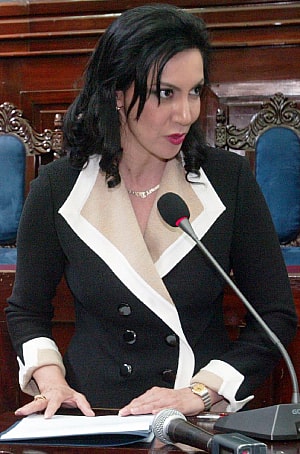Leále Tiekat: Difference between revisions
mNo edit summary |
mNo edit summary |
||
| Line 40: | Line 40: | ||
She has written 6 books: | She has written 6 books: | ||
* ''The Magazine and the State'' (1997), which explores the relationship between ''[[Risveglio Nazionale]]'' and [[Donatellism]], as well as its broader influence on the [[Gylian consensus | * ''The Magazine and the State'' (1997), which explores the relationship between ''[[Risveglio Nazionale]]'' and [[Donatellism]], as well as its broader influence on the [[Gylian consensus]]. Leále argues the relationship between the two was far more mutually beneficial and inspirational than previously perceived. | ||
* ''The Sheltered Economy'' (2000), which argues that Gylias has a huge and interventionist government policy compared to the [[Tyran]]ian average, and this government action is crucial to the success of the economy. She emphasises the key influence of Donatellism and [[Sae Chabashira]]'s {{wpl|developmental state}} policies on the broader direction of the [[Darnan Cyras government]], and explores how these statist viewpoints were reconciled to [[Anarchism in Gylias|anarchist]] means and goals. | * ''The Sheltered Economy'' (2000), which argues that Gylias has a huge and interventionist government policy compared to the [[Tyran]]ian average, and this government action is crucial to the success of the economy. She emphasises the key influence of Donatellism and [[Sae Chabashira]]'s {{wpl|developmental state}} policies on the broader direction of the [[Darnan Cyras government]], and explores how these statist viewpoints were reconciled to [[Anarchism in Gylias|anarchist]] means and goals. | ||
* ''Marketheism'' (2004), an extended criticism of {{wpl|free market fundamentalism}} in economics, which she compares to religious fundamentalism. | * ''Marketheism'' (2004), an extended criticism of {{wpl|free market fundamentalism}} in economics, which she compares to religious fundamentalism. | ||
Revision as of 07:26, 22 October 2019
Leále Tiekat | |
|---|---|
 | |
| Born | 6 June 1966 |
| Nationality | Gylian |
| Occupation | Economist |
Leále Tiekat (born 6 June 1966) is a Gylian economist. She is a professor of economics at the Regional University of Mayt. Her main research interests are related to the developmental state, economic planning, and the use of public policy to achieve sustainability.
Leále is considered an influential "neo-Donatellist" economist, and is an active blogger and public figure. In 2016, she was described by The Gylian Journal as one of the country's most influential economists.
Biography
Leále was born on 6 June 1966 in Tavis. Her family had an academic background: her parents were a professor of mathematics and a statistician for the Public Works Assessment Inspectorate.
She studied economics at the University of Aðunas, graduating in 1988. She subsequently obtained an MA in economics from the Regional University of Argyrokastron in 1992, and a PhD in economics from the Federal University of Mişeyáke in 1996. Her doctoral thesis examined the relationship between Risveglio Nazionale and Donatellism, and would form the basis of her first book.
Leále was an assistant professor at the University of Zaul from 1996 to 1998, and subsequently became a professor. She has taught at various Gylian universities, but is mainly based at the Regional University of Mayt.
In addition to her academic work, she has been a member of Envadra's regional advisory council and the Public Advisory Council, and was nominated by President Laura Varnaþ to the Senate, serving between 1 June and 1 September 2010.
She has worked as an economic advisor to various Gylian and foreign governments.
Work
Leále's research focuses on the role that the state and public sector play in economic development. She describes herself as a "left-Donatellist" and, in the context of the statist–anarchist divide, a statist.
She supports the idea of the state as a tool for democratic control of the economy and a vehicle for progressive change. Her studies focus on the impacts of economic interventionism on the economy, and the public sector's role as a dynamic force for growth.
Her work synthesises Donatellism with the developmental state, green economics, and decentralisation and localism.
She has written 6 books:
- The Magazine and the State (1997), which explores the relationship between Risveglio Nazionale and Donatellism, as well as its broader influence on the Gylian consensus. Leále argues the relationship between the two was far more mutually beneficial and inspirational than previously perceived.
- The Sheltered Economy (2000), which argues that Gylias has a huge and interventionist government policy compared to the Tyranian average, and this government action is crucial to the success of the economy. She emphasises the key influence of Donatellism and Sae Chabashira's developmental state policies on the broader direction of the Darnan Cyras government, and explores how these statist viewpoints were reconciled to anarchist means and goals.
- Marketheism (2004), an extended criticism of free market fundamentalism in economics, which she compares to religious fundamentalism.
- The Entrepreneurial State (2009), which argues that the state (or public sector) is the primary source of dynamic entrepreneurship and innovation in the economy, not the private sector. She argues that the public sector is the primary risk taker in innovation-based investments, and explores how publicly-funded research was essential to the emergence of new technologies, particularly the digital revolution.
- Enterprise without Capitalism (2012), which explores how Gylias has been able to appropriate "appealing elements" associated with capitalism for its market socialist economy, leaving capitalism associated with only its worst aspects in the public imagination. Examples include merchants for the "enterprising spirit", community markets for markets as a distribution mechanism, and the Institute for the Protection of Leisure for the notion of creative destruction.
- The Great Redirection (2015), which develops the concept of the state's role in the economy as one of "creating and shaping new markets" into an analysis of how public policies can achieve the redirection of the entire economy towards ecological sustainability.
Personal life
Leále is married with three children. She is an avid cyclist.